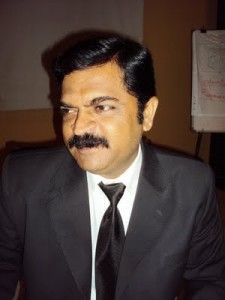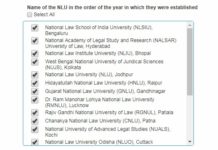 [By our standards, this is one of the more unconventional interviews that we have done. Breaking out of the simple mould of interviewing NALSAR seniors with shining careers, we bring to you legal eaglets a prominent face from across the border – Mr. Amer Nadeem.
[By our standards, this is one of the more unconventional interviews that we have done. Breaking out of the simple mould of interviewing NALSAR seniors with shining careers, we bring to you legal eaglets a prominent face from across the border – Mr. Amer Nadeem.
Mr. Nadeem is a celebrated human rights activist from Pakistan. He has campaigned extensively for several minority rights’ causes, and has done inimitable work on the reform of Hindu Marriages in Pakistan. He is currently the legal consultant on minorities with ActionAid Pakistan, and is also a member of the advisory board of Jurists, an international Human Rights NGO.
Mr. Nadeem talks to us about the Law and its practice in Pakistan in general, and the problems faced by the Pakistani Hindu community in particular. – Sandipan De]
CLATGyan: Sir, tell us about your background. Why law?
Amer Nadeem: The law is my passion. Lawyers are “social engineers”. If I were to be born a second time, I would love to be involved with the world of the law again.
I did my LL.B. from the Punjab University in Lahore with distinction, and I have been practicing as a High Court lawyer since the year 2000. I have worked extensively on socio-legal issues in Pakistan – especially with minorities. My work in this regard has been quite extensive, ranging from major research undertakings to helping draft the bill for procedural reform of the Hindu marriage.
CG: Can you in a nut-shell put before us the work you are doing with regard to codification and formulation of Hindu Personal laws in Pakistan?
AN: In Pakistan, a long history of army rule has affected negatively almost every sphere of democratic values, including legislation. Minorities, especially Hindus, have been affected the most. During my legal practice, interaction with civil society and other such communications, I came to know that there has been no significant legislation on Hindus Personal Laws since 1947. Legislation on family, inheritance and other facets of Hindu personal life is grossly limited.
It is pertinent to note that there are around 4.5 million Hindus out of 88 million people belonging to the minorities. So I took the issue of Hindu marriage registration only as a test case.
Another pertinent point is that the Hindus community in Pakistan is rather non-active and slacked about its rights. I remember it being extremely difficult to convince the community about the issue. Even presently, there are Hindus 7 MNAs out of 10 minorities, yet they are reluctant to raise their voices for their cause.
CG: What is the issue as a whole regarding registration of Hindu marriages?
AN: In Pakistan, most religious communities have their respective marriages registration rules and Certificates of Marriage for married couples, except the Hindu community. The constitution of Pakistan promises ample protection and safeguards to the religious minorities without any discrimination. However, Pakistani Hindu couples face many problems due to the non availability of their certificates of marriage. The couples are stranded without legal entity and proof of their ‘spouseship’. Their marriages are without legal authentication. The acknowledgement of their matrimonial relationship is at the sweet will of concerned authorities or departments in Pakistan, whether the officials recognize them as husband and wife or otherwise. This amounts to discrimination and injustice against a minority, which is not the essence of the law.
In their daily lives, the Hindu couples – especially wives – face severe problems. For example, in Pakistan for the preparation of necessary documents like National Identity Card, Domicile, Passports and other documents, the marital status of the applicant is mandatory. Questions on whether one is married, the name of the spouse, the identity of the spouse; as well as availability of proof of marriage, certificates of marriage etc. are always problematic for married Hindu applicants. At the moment, the couples are helpless and at the mercy and grace of those officials. The non-availability of the marriage certificate often leads further to corruption.
In many cases, one of the spouses, often husband, refuses to recognize the other partner as his/her better half. In a number of cases, even the parentage of the children was denied by the father. In such a situation, the wife is in a predicament to prove the existence of her marriage and/or maternity over her minor children, as she has no documents at all to prove her version of the story. Likewise, while travelling, especially during police checks, the Hindu couples are unable to prove that they are married. On a number of occasions, the proof of marriage is a mandatory requirement. This leaves the couple in an embarrassing position. Moreover, Hindu couples face many problems with law enforcement agencies and courts on account of non-registration of their marriages and being without valid certificates of marriage. In the way rights of the couple are vulnerable and at stake.
On the issue of non registration of Hindu marriages, a campaign has been launched in Pakistan. Some individuals and non government organizations have raised the demand to the government of Pakistan to formulate rules for the registration of Hindu marriages.
CG: Why is there an opposition from the Hindu community on the divorce clause of the earlier Act?
AN: Yes, there are concerns on the divorce issue. The Hindus refer to their religious norms, claiming that Hinduism does not allow divorce – despite the fact in India, Section 13 of the Hindu Marriage Act 1955 recognizes the dissolution of marriages. Presently, the Pakistan National Commission on Status for Women considering a bill on divorce along with my bill on the registration of marriages. In the last meeting of NCSW, which was attended by me on special invitation, it was announced that the government was seriously considering passing laws on Hindu Marriages and divorce too.
CG: Do you think it is a cultural issue that as a minority, the Hindus in Pakistan do not wish to depart from the traditionalities, since they perceive this as a threat and precursor to extinction of cultural values?
AN: This is 100% true. That is the dilemma we face while campaigning for the Hindu marriage registration issue. This stems from their financial, social and educational backwardness. In fact, here in Pakistan, there are visible divisions between upper class wealthy Hindus and the lower classes (Schedules/dalits) who are victims of extreme poverty and neglect. Both extremes rarely even shake hand or dine together!
CG: What inspired you to work in this particular area?
AN: The state of the downtrodden and depressed minority, with slip-slop living. They are segregated from the society, considered almost non-human entities.
CG: One profound difference you find between the Indian legal system and that of Pakistan even though the genesis of both is the same?
AN: I find little difference between the two, as the basics of both systems are the same. However, I’m inspired by the bulk of legislation enacted by the Indian parliament, which is missing in Pakistan. The judicial activism which embraced the Indian Supreme Court in 1991, we saw in 2007 in the form of the lawyers’ movement. Pakistan merely lags behind on account of long-standing army rules.
CG: What are your views on the current dispute between the Supreme Court and the PM’s office with regard to the President’s corruption case?
AN: I think the Supreme Court overstepped its jurisdiction at some junctures. The parliament’s supremacy must be upheld. The fate of politicians should be decided by the people of the land. On the other hand however, the PM should have honored the SC decision.
CG: Do you think that the judiciary of Pakistan has once again come back on a strong foot with the resounding public support for democratic values and ideals which took a backseat during previous regimes?
AN: That is the case. Pakistan’s judiciary has gained this respect, awe and strong footing with its sacrifices and with the support of the people of Pakistan. People have placed much trust in the judiciary, as opposed to the other organs of governance in the land.
CG: Assuming you are well aware of the changes in the Indian legal education system, especially it being now a 5 year integrated course you take up after school, what are your views on the National Law School system?
AN: That’s really great. Law college’s networking paves the way for future legal work and research, and acts as a nursery for future politicians – as lawyers have always played pivotal roles in politics. One may recall the shining role of Mahatma Gandhi, Qaud-I-Azam, Jawahar lal Nehru, Maulana Abul Qalam Azad, Allama Iqbal and others with legal backgrounds in shaping the political systems of our countries.
CG: Your thoughts on the future of the Bar and the Bench in Pakistan and scope for collaboration with India?
AN: Yes, collaboration is taking place already. Almost every year, the Pakistani and Indian Supreme Court Bars and the Punjab Bars on both sides arrange visits to the neighboring nation. What is missing? It is legal research on laws of the other; little work has done on this arena. For this purpose, the emerging young lot can play a vital role. Senior lawyers do not have much time beyond their busy law practice.















Hats off to Mr. Nadeem!!! 🙂
And to CLAT Gyan!
How did you guys come across such an eminent personality?
Nice interview!!!! Really happy to know that there are Pakistanis who care for Hindus over there. And when can we expect our new GK compendiums ( Sorry for being so demanding!!!) ??
great work by amer nadeem, he z rt here a lot of work is needed by for minorities.
lot of thing to be done, anyhow amer’s contribution is appreciated.
I remember watching a documentary on the same topic about a year ago which highlighted the problems faced by the Hindu married couples in Pakistan. The condition is worse for Pakistani ‘dalits’. They are in minority within the minority.
It’s good to see people like Mr Nadeem who are working for the betterment of Hindus in Pakistan.